Generative AI in Healthcare: Reshaping Health Dynamics
The conversation between both industry leaders delved into ethical considerations, security measures, and the future trajectory of healthcare, providing valuable insights for both startups and established players. The interview captures the essence of their expert analysis and the critical questions addressed, highlighting the profound implications of Generative AI in the healthcare sector.
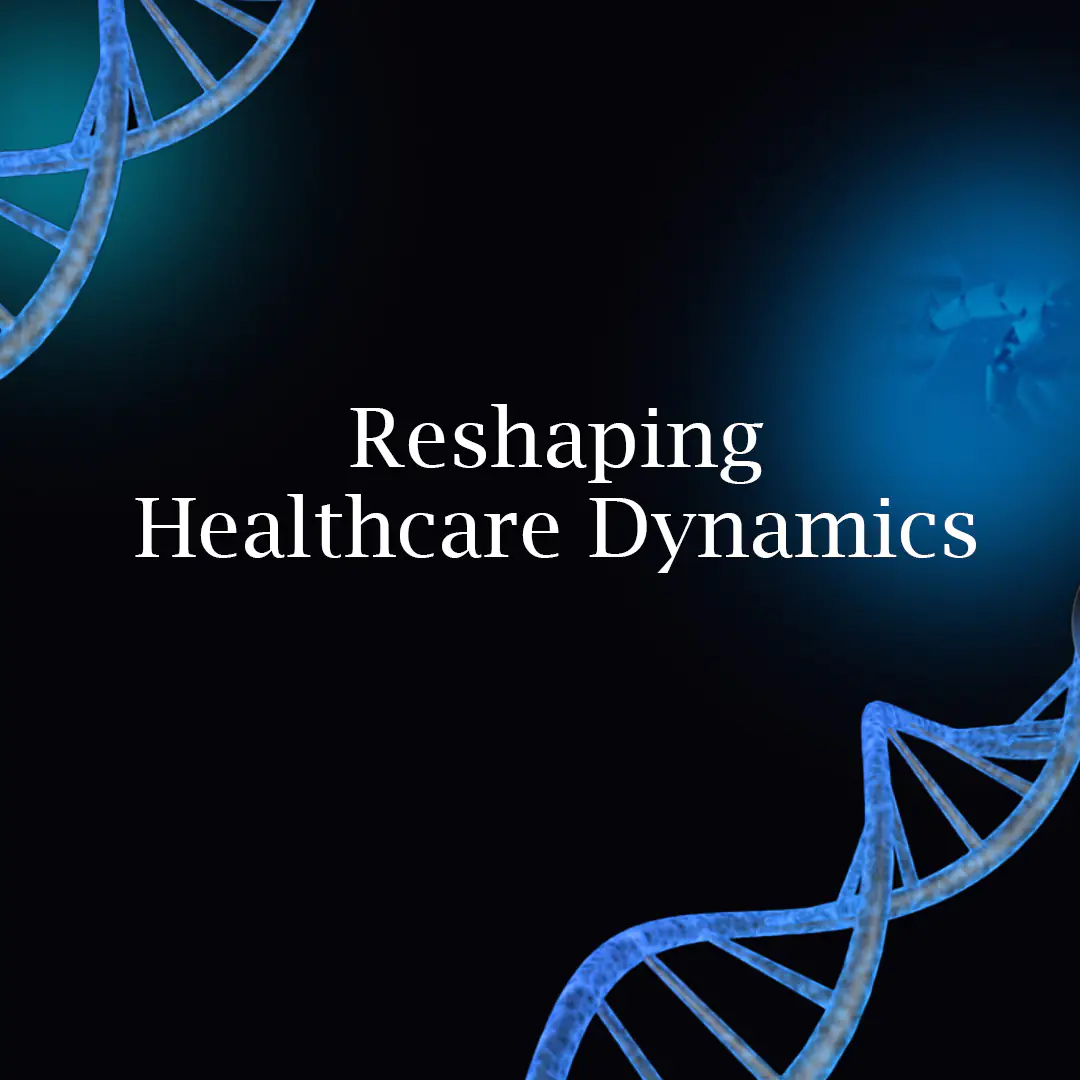
Tackle Healthcare Inefficiencies with Our Cutting-Edge Generative AI Solutions for Optimal Care

“Generative AI algorithms can analyze large volumes of medical data and create entirely new content. The technology can improve the quality of care, make it more accessible and affordable, reduce inequities in research and care delivery, and help companies unlock value in new ways.”– BCG
Importance of Generative AI in Healthcare
Generative AI is poised to revolutionize healthcare by enabling unprecedented advancements in diagnostics, health treatment, and patient care. By analyzing vast amounts of data, Gen AI can identify patterns and provide insights that were previously unattainable. It enhances medical imaging, allowing for more accurate and timely diagnoses. As per Mckinsey, Generative AI, while eliciting both excitement and concern among healthcare professionals and technologists, is a significant advancement over traditional AI applications like adverse-event prediction and OR scheduling. It holds the potential to unlock a substantial portion of the healthcare industry’s unrealized $1 trillion improvement potential.
In genomic medicine, AI facilitates the development of personalized treatment plans tailored to individual genetic profiles, leading to better patient outcomes.
- Gen AI-driven precision health initiatives can predict disease risks and enable proactive interventions.
- Generative AI can streamline administrative tasks, reducing the burden on healthcare professionals and improving efficiency.
- Ethical AI implementation ensures patient data privacy and addresses biases, promoting equitable healthcare access.
Generative AI in Healthcare: Industry Leaders Address Pivotal Insights
Deepak Mittal posed seven pivotal questions about the future of Generative AI in healthcare, to which Partha Anbil provided insightful and comprehensive answers. Their discussion highlights the transformative potential and critical considerations of Gen AI in the healthcare industry.
 1. Deepak Mittal: The Generative AI market in healthcare is projected to surge to USD 24.9 billion by 2032 from its 2022 figure of USD 1.2 billion, with a CAGR of 35.8%. What specific generative AI trends do you foresee playing a pivotal role in healthcare applications in 2024, and how are they reshaping the industry?
1. Deepak Mittal: The Generative AI market in healthcare is projected to surge to USD 24.9 billion by 2032 from its 2022 figure of USD 1.2 billion, with a CAGR of 35.8%. What specific generative AI trends do you foresee playing a pivotal role in healthcare applications in 2024, and how are they reshaping the industry?
Partha Anbil: As we look towards 2024, several key trends are expected to play pivotal roles in healthcare applications, reshaping the industry and impacting traditional healthcare product markets, business models, and processes. For example:
- Clinical Workflow & Patient Engagement: Clinical workflow optimization and patient engagement are anticipated to be standout Generative AI use cases in healthcare. This trend suggests that AI will be increasingly integrated into the day-to-day operations of healthcare providers, enhancing the efficiency of clinical processes and improving the patient’s experience.
- Focus on Healthcare Delivery: Generative AI is expected to enable doctors to concentrate more on healthcare delivery by reducing the time spent on administrative tasks. This shift will allow healthcare professionals to focus on patient care, potentially improving outcomes and patient satisfaction.
- Tailored Data for Competitive Edge: The ability to tailor data using Generative AI is becoming a crucial competitive edge for healthcare organizations. By leveraging personalized data, providers can offer more accurate and effective treatments, which is a significant step toward personalized medicine.
- Intensifying Competition: The healthcare sector is bracing for intensified competition as more players adopt Generative AI technologies. This could lead to a surge in innovation and improvements in digital healthcare services.
- Drug Discovery & Development: Generative AI is revolutionizing drug discovery and development, making the process faster and more efficient. This advancement is crucial for bringing new treatments to market more quickly and could significantly impact the pharmaceutical industry.
- Medical Diagnostics & Imaging: Generative AI enhances the precision of disease diagnosis and medical imaging. This improvement in diagnostic capabilities is likely to lead to better patient outcomes and more efficient healthcare delivery.
- Personalization & Predictive Analytics: Generative AI is enabling true personalization in healthcare and playing a crucial role in predictive analytics for drug benefits and toxicities, especially in cancer treatment. This trend is indicative of a more tailored approach to patient care, where treatments and interventions are increasingly customized to individual patient needs.
Impact on Traditional Healthcare Markets & Processes
- Efficiency & Decision-Making: Generative AI is improving efficiency and enabling quicker decision-making within healthcare organizations. This enhancement in operational efficiency could disrupt traditional business models that are less agile and adaptive.
- Workforce Augmentation: AI is set to play a large role in augmenting the healthcare workforce, particularly in temporary clinician staffing and relieving administrative workloads. This could reshape traditional staffing models and reduce the administrative burden on healthcare professionals.
- Education & Training: Gen AI is creating a new paradigm for education and training in healthcare. This could lead to a shift in how healthcare professionals are trained, with a greater emphasis on problem-solving skills and the use of AI in curriculum development.
- Revenue Cycle Management: Predictive analytics powered by AI will be instrumental in revenue cycle management. This could transform traditional billing and payment processes, making them more efficient and less prone to errors.
- Patient Care and Support: Generative AI’s role in patient care and support is expanding, with the potential to develop reliable medical chatbots and other support tools. This trend could lead to a shift in how patients interact with healthcare systems and access care.
Challenges & Considerations
Despite the promising trends, the adoption of Generative AI in healthcare faces several challenges, including ensuring data privacy and security, collaboration with healthcare professionals, ethical guidelines, bias mitigation, and regulatory compliance. Addressing these challenges is crucial for the successful and responsible implementation of Generative AI in healthcare.
2. Deepak Mittal: How is Generative AI advancing medical diagnosis images, genomic medicine, and precision health, contributing to transformative breakthroughs in healthcare applications?
Partha Anbil: Generative AI is rapidly advancing in the field of healthcare, particularly in medical imaging, genomic medicine, and precision health. By generating synthetic datasets and enhancing diagnostic capabilities, this technology is contributing to transformative breakthroughs in healthcare applications.
- Generative AI Advancements in Medical Diagnostic Imaging: Generative AI is revolutionizing medical imaging by improving the quality and resolution of diagnostic images. Algorithms can enhance low-resolution images to high-resolution, aiding in the early detection of diseases. This is particularly beneficial in identifying subtle abnormalities that human radiologists may miss. Generative AI also provides ample data for training and fine-tuning medical imaging models by generating synthetic images, which is crucial given the often-limited availability of medical data.
- Contributions to Genomic Medicine & Precision Health: In genomic medicine, Generative AI is enabling the analysis and interpretation of vast amounts of patient data, including genomic sequences. This allows for the identification of patterns and relationships that may not be apparent to human experts, thus advancing personalized medicine. By tailoring treatments to individual genetic profiles, patients receive more effective and less invasive care. Generative AI’s role in predicting protein structures and interactions is fundamental to drug design and development, offering new therapeutic strategies.
- Transformative Breakthroughs in Healthcare Applications: Generative AI is making significant contributions to diagnostics by enhancing the accuracy and efficiency of disease detection. It plays a significant role in advancing personalized medicine by enabling the analysis of patient data to optimize treatment outcomes. Furthermore, Generative AI algorithms can generate virtual compounds with desired properties, reducing the need for laborious and expensive laboratory experiments in drug discovery.
- Ethical Implications of AI-Generated Content: The rise of Generative AI in healthcare brings ethical concerns that must be addressed. Ensuring data privacy, reducing biases, and preserving the human touch is foundational to the future of AI in healthcare. Transparent and responsible use of Generative AI is essential to maintain public trust. Regulatory agencies must develop frameworks to evaluate and approve AI-generated solutions, ensuring that innovations are accessible, safe, and efficient.
The generative AI’s transformative impact is undeniable, offering new avenues for innovation and precision in patient care. However, responsible implementation, ethical considerations, and robust regulatory frameworks are vital to ensure that the potential benefits of Generative AI are harnessed while minimizing possible risks.
3. Deepak Mittal: In the ongoing debate surrounding open-source vs closed-source models, what is your perspective on the most suitable approach for the healthcare sector? Are healthcare considerations that favor one model over the other, considering factors such as transparency, security, and collaboration?
Partha Anbil: In the healthcare sector, open-source software models offer several advantages over closed-source models, particularly in terms of transparency, security, and collaboration.
- Transparency: Open-source software allows for external auditing of source code, which can help identify and address security vulnerabilities more quickly than closed-source software. This is crucial in healthcare, where patient safety is paramount. The ability to inspect and verify the code ensures that there are no hidden functions or vulnerabilities that could compromise patient data or system integrity.
- Security: Open-source software communities often prioritize security, as they have a strong incentive to publicize bugs and fix them promptly. An asset search was conducted post-completion of distribution of proceeds of e-auction of assets in the Liquidation estate of the Corporate Debtor, which surfaced two properties. The collective scrutiny of many developers helps to quickly identify and mitigate potential threats, enhancing overall security.
- Collaboration: Open-source software encourages collaboration among developers, which can lead to more innovative and efficient solutions. This is particularly important in healthcare, where collaboration among medical professionals, researchers, and technology developers can accelerate progress and improve patient outcomes. Shared knowledge and resources can drive rapid advancements and foster a community-driven approach to problem-solving.
- Cost Savings: Open-source software is often free or low-cost, which can be a significant advantage for healthcare organizations, especially those in developing countries. This can help level the playing field and ensure that all healthcare providers have access to the latest technology. The reduced financial burden allows for more resources to be allocated towards patient care and other critical areas.
However, open-source software may have some drawbacks, such as slower development cycles and a lack of commercial support compared to closed-source software. Additionally, open-source software may not have the same level of polish and user-friendliness as closed-source software, which can be a concern for healthcare organizations that require user-friendly interfaces. However, healthcare organizations should carefully consider the trade-offs between open-source and closed-source models to ensure that they choose the best approach for their specific needs.
4. Deepak Mittal: Recent studies indicate that by 2025, approximately 75% of healthcare organizations will have invested in AI-driven technologies for EHR integration. Could you shed light on how seamless the integration of Generative AI technologies with existing EHR systems is? What challenges are expected in this regard, and how might adopting Generative AI change the operating models of healthcare organizations?
Partha Anbil: Recent studies and industry trends indicate a growing recognition of the importance of seamless Generative AI integration in enhancing data-driven healthcare solutions.
Generative AI technologies, such as ChatGPT, can enhance information collection efficiency, engage patients in understandable language, and optimize operational processes. The integration of Generative AI with existing EHR systems is not without its challenges. Some of the expected challenges include the need to train AI systems on sufficiently large medical datasets, mitigate potential risks, and address algorithmic bias and data security concerns. Adopting Generative AI is expected to change the operating models of healthcare organizations by enabling personalized treatment, improving patient engagement, and optimizing operational processes.
To ensure successful integration and adaptation of Generative AI technologies, healthcare organizations should consider the following:
- Responsible Use: Design workflows where AI supports, rather than replaces, physicians in the diagnostic process to ensure human oversight and accountability.
- Mitigating Risks: Actively address algorithmic bias and data security concerns to maintain trust and efficacy.
- Training & Guidelines: Provide comprehensive training resources and guidelines to upskill employees and integrate AI seamlessly into daily operations.
- Regulatory Compliance: Adhere to regulatory standards to facilitate data exchange and interoperability, ensuring compliance with privacy and security regulations.
While the integration of Generative AI technologies with existing EHR systems holds great promise for enhancing data-driven healthcare solutions, it is essential for healthcare organizations to carefully consider the challenges, risks, and necessary measures to ensure successful integration and adaptation. Responsible use, mitigating risks, training and guidelines, and regulatory compliance are crucial considerations in this regard.
5. Deepak Mittal: Studies reveal that healthcare providers utilizing Generative AI for medical report summarization have experienced up to a 40% reduction in the time required for data analysis and report generation, significantly improving operational efficiency and resource allocation. How do you perceive Generative AI shaping the landscape of medical report summarization and conversation AI chatbots?
Partha Anbil: Generative AI is significantly transforming the landscape of medical report summarization and conversation AI chatbots, enhancing both efficiency and communication in healthcare.
- Medical Report Summarization: Generative AI enables the quick and accurate summarization of medical records, leading to a substantial reduction in the time required for data analysis and report generation by up to 40%. This technology leverages large language models to extract key information and identify relevant patterns in medical documents, thereby improving operational efficiency and resource allocation. By utilizing natural language processing techniques, Generative AI can convert unstructured medical data into structured summaries, making the process faster, more accurate, and more efficient.
- Conversation AI Chatbots: In the context of conversation AI chatbots, Generative AI models, such as GPT-4, facilitate quick retrieval of specific medical details and enhance the accessibility of information for both healthcare providers and patients. These chatbots can provide instant responses and detailed medical information, improving communication and patient engagement.
- Ethical Considerations: The ethical implementation of these technologies is paramount. There are concerns about potential biases and diagnostic blind spots in AI chatbots. Continuous efforts to mitigate bias and ensure the fairness, equity, and safety of these AI systems are essential for their effective deployment in healthcare settings.
Generative AI is revolutionizing medical report summarization and conversation AI chatbots by improving efficiency, communication, and the accessibility of critical medical information. It achieves this by automating the summarization process, saving time and resources, and generating accurate and accessible summaries. In conversation AI, it enhances the communication capabilities between healthcare providers and patients.
6. Deepak Mittal: As you know, without robust security measures, sensitive healthcare data processed by Generative AI algorithms is vulnerable to unauthorized access, data breaches, and potential misuse. Do you foresee any existential or catastrophic risks associated with the use of Generative AI in healthcare? What security measures are being implemented to safeguard sensitive healthcare data processed by Generative AI algorithms?
Partha Anbil: Generative AI in healthcare presents both significant opportunities and challenges. While it has the potential to revolutionize processes, improve accuracy, and support better decision-making, it also poses risks around data privacy, data accuracy, and potential misuse of information. The use of Generative AI in healthcare is particularly complex due to the sensitive nature of health data and the need to comply with strict regulations. To address these concerns, various security measures are being implemented to safeguard sensitive healthcare data processed by Generative AI algorithms. These measures include robust data governance, thorough vetting processes, maintaining transparency, and ensuring compliance with regulatory requirements such as GDPR and HIPAA.
The potential risks associated with Generative AI in healthcare, such as data privacy concerns and discriminatory use, have led to increased regulatory scrutiny. Regulators are focusing on the responsible and safe use of this technology, emphasizing the need for transparency, accountability, and the protection of patient privacy.
Healthcare organizations are advised to adopt a cautious approach and ensure that Generative AI is used responsibly to mitigate unintended consequences. This includes prioritizing transparency, informed consent, and the protection of patient privacy.
7. Deepak Mittal: As we conclude, what key takeaway or insight would you like our audience to remember about the profound impact of 2024’s Generative AI trends on the future of healthcare? How can startups effectively compete and collaborate with established players in the healthcare sector, considering the access incumbents have to large amounts of proprietary healthcare data?
Partha Anbil: The profound impact of 2024’s Generative AI trends on the future of healthcare is significant. Generative AI, particularly large language models, has the potential to revolutionize healthcare delivery by making it more efficient, personalized, and effective. Startups can effectively compete and collaborate with established players in the healthcare sector by emphasizing data strategy optimization, milestone achievement, effective go-to-market plans, and strategic partnerships to secure funding. They can also consider building proprietary generative AI software to establish competitive differentiation and define generative AI governance and guardrails to ensure its proper use.
Additionally, startups can leverage generative AI to address administrative inefficiencies and back-office operations, improve patient engagement, and support clinical decision-making.
Conclusion
The interview with Deepak Mittal and Partha Anbil delved into pivotal insights regarding the transformative impact of Generative AI in healthcare domain in 2024. From enhancing medical diagnostics and personalized treatment through AI-driven advancements in genomic medicine to revolutionizing medical report summarization and patient engagement with AI chatbots, the potential of Generative AI is vast.
Looking ahead, it’s clear that Generative AI will continue to shape healthcare by optimizing operational efficiencies, improving decision-making processes, and ultimately enhancing patient care outcomes. Startups have a unique opportunity to innovate and collaborate with established players by focusing on data strategy optimization, milestone achievement, and building proprietary Generative AI solutions.
Contact us for future discussions and events on emerging technologies in healthcare. Join us in exploring how Generative AI and other cutting-edge innovations are reshaping the future of healthcare delivery and patient outcomes. Together, let’s pioneer the next generation of healthcare solutions.
Stay informed and check our upcoming events. Your participation is key to driving meaningful advancements in healthcare through technology.
Related Blogs
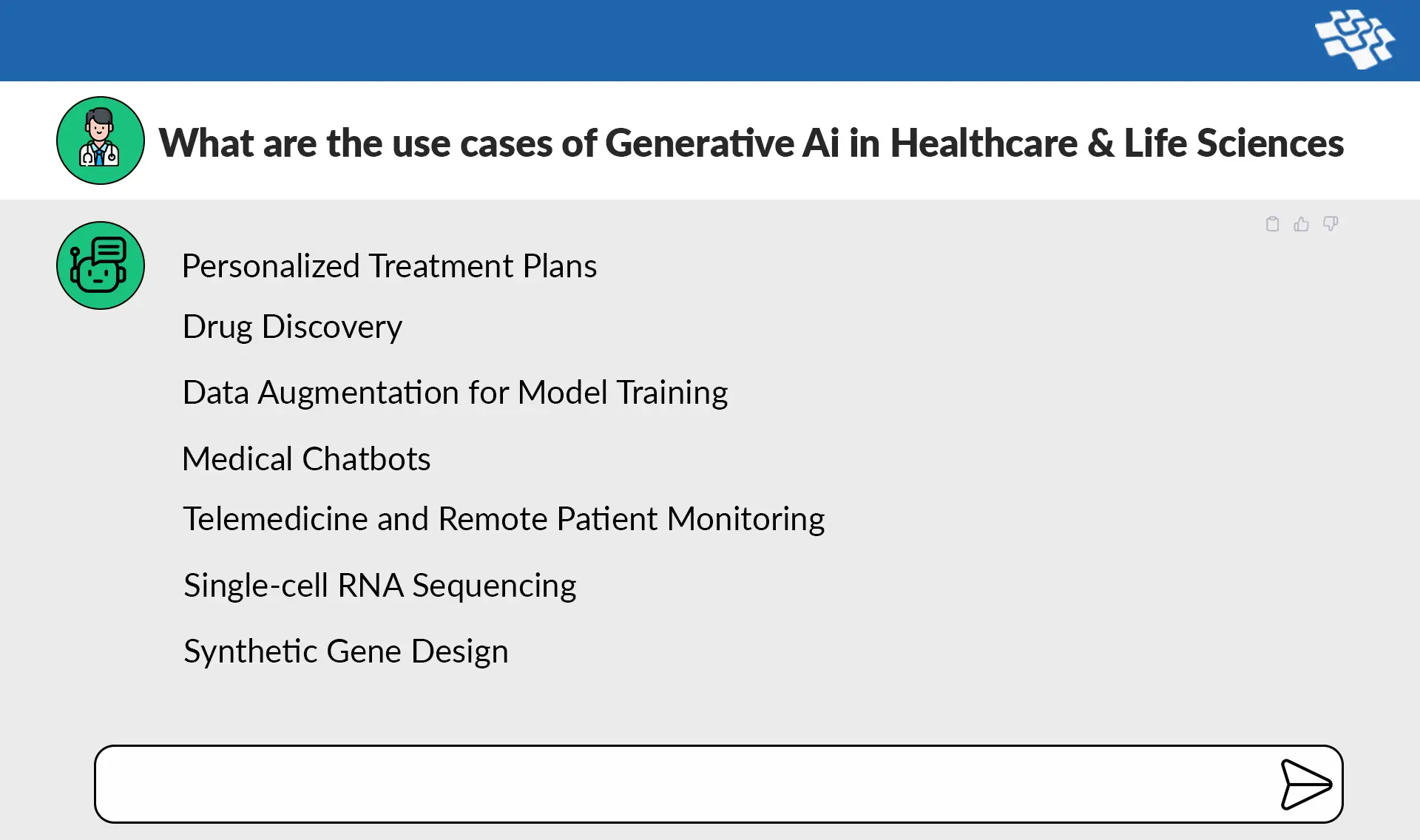
Adoption of Generative AI in Healthcare & Life Sciences
Generative AI in healthcare and life sciences is rapidly transforming the landscape, offering immense potential to revolutionize the industry. It’s ability to analyze large-scale medical data and create new content elevates the standard of care, increases accessibility, and reduces disparities..
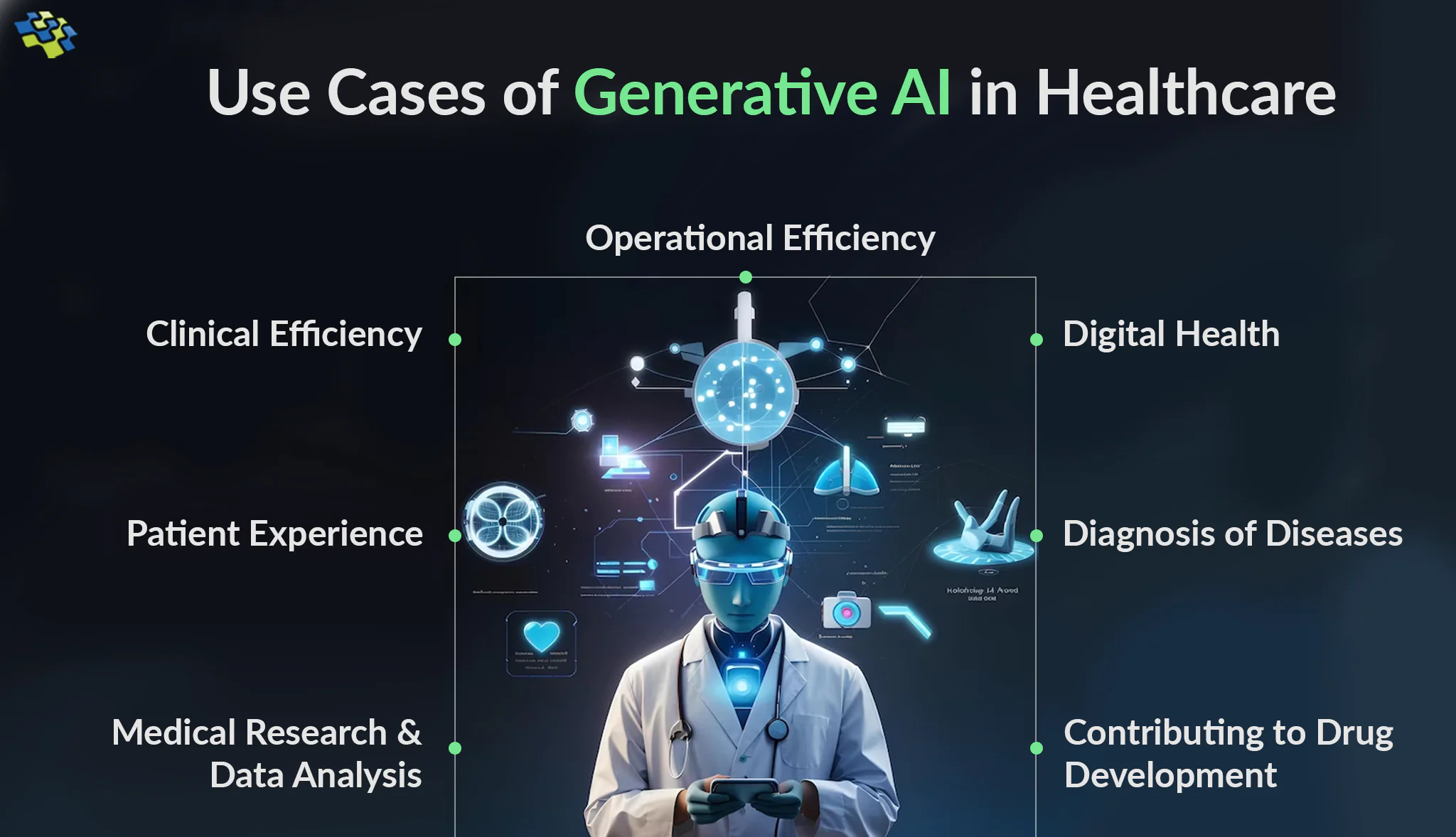
7 Most Crucial Use Cases of Generative AI in Healthcare
Generative AI in healthcare is taking the medical world by storm, offering groundbreaking solutions left and right. Picture this: by 2032, the global Generative AI market is set to hit a whopping $118.06 billion! That’s no small change, let me tell you. This technology offers innovative solutions...
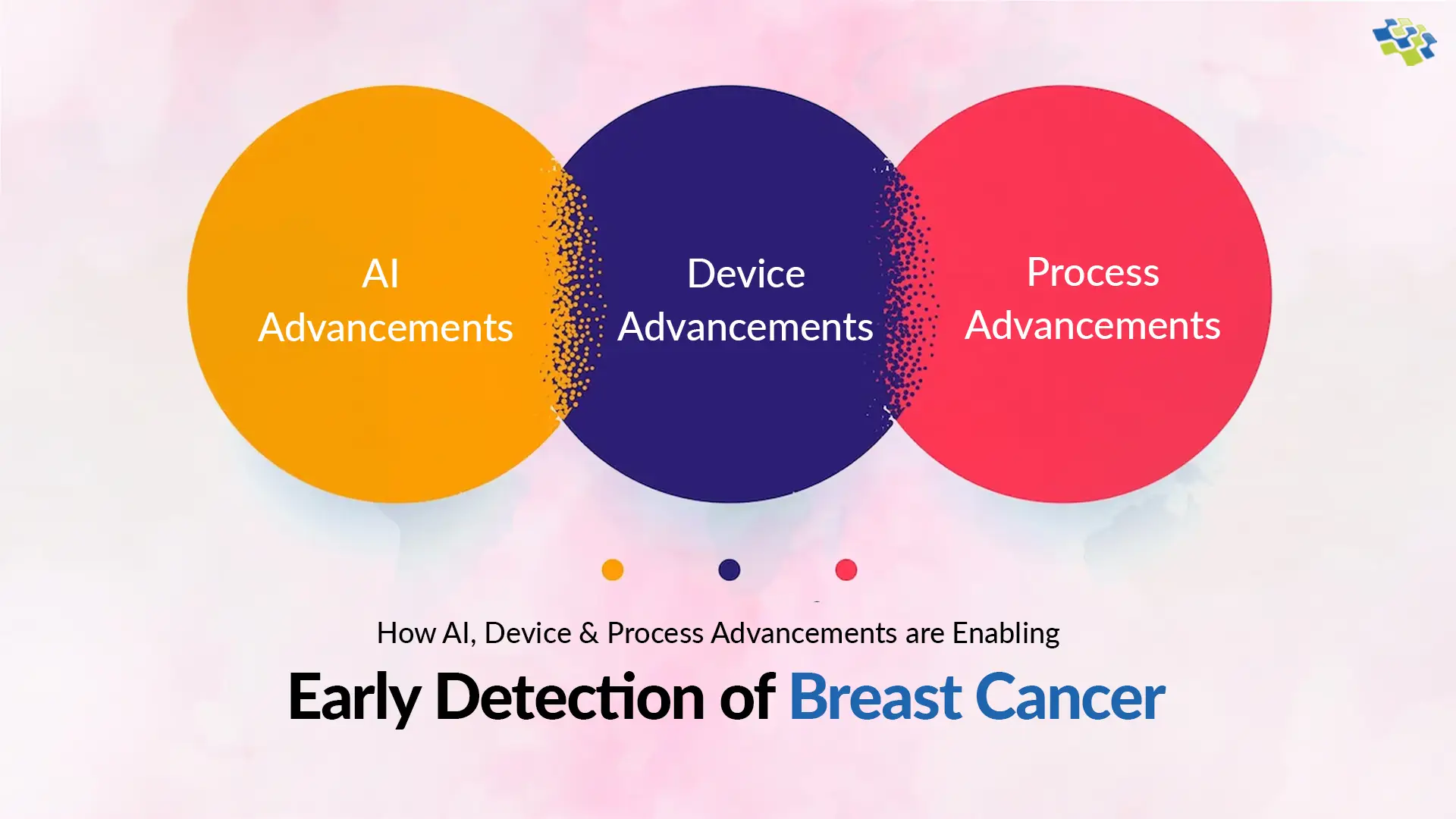
Technological Advancements for Early Detection of Breast Cancer
Deepak Mittal, CEO and Founder of NextGen Invent, and Partha Anbil, Advisor at NextGen Invent, conducted an insightful interview on the transformative impact of Generative AI in healthcare for 2024. Partha is a long-time Life Sciences consulting industry veteran, currently working as SVP...
Stay In the Know
Get Latest updates and industry insights every month.
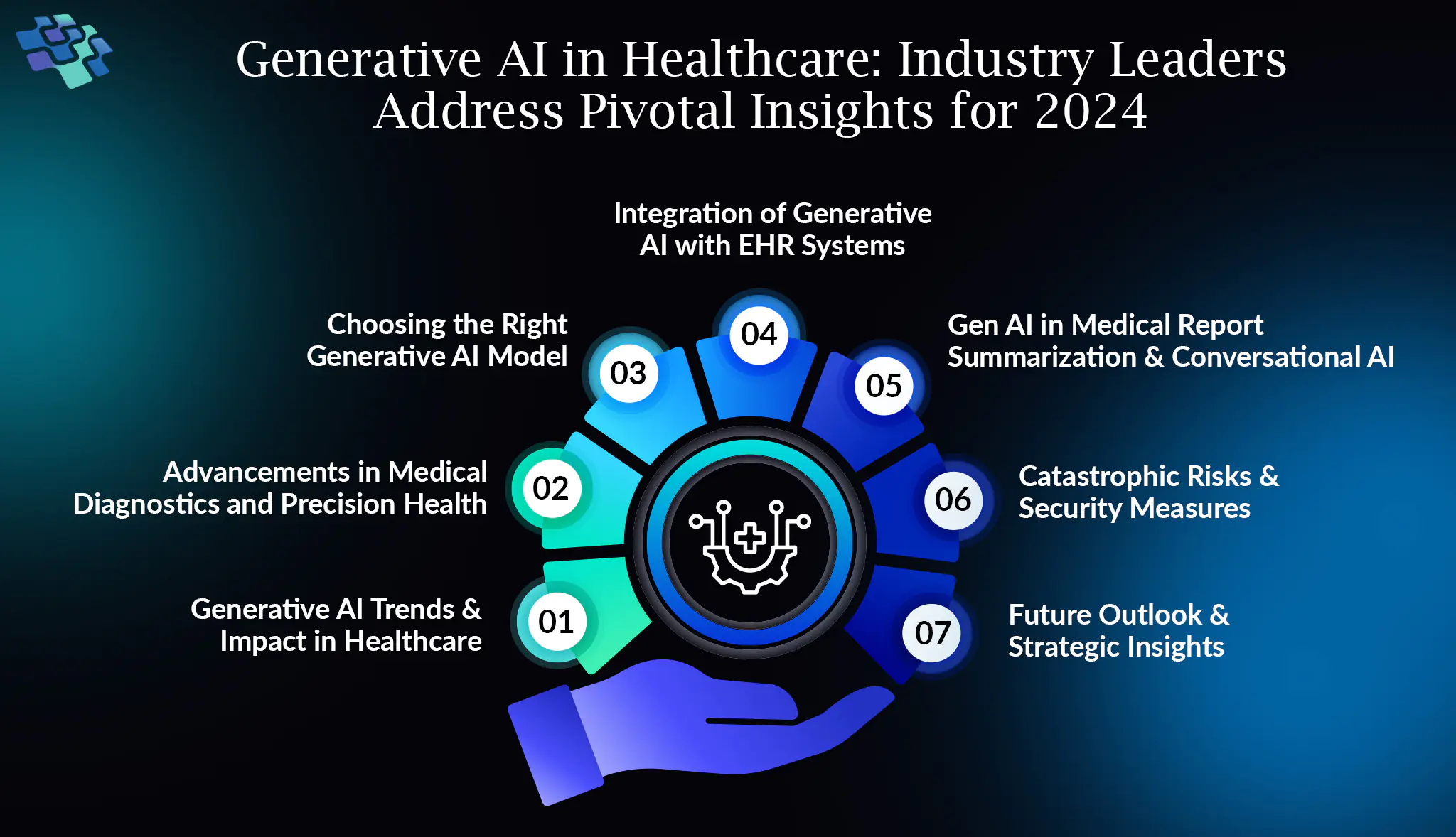 1. Deepak Mittal: The Generative AI market in healthcare is projected to surge to USD 24.9 billion by 2032 from its 2022 figure of USD 1.2 billion, with a CAGR of 35.8%. What specific generative AI trends do you foresee playing a pivotal role in healthcare applications in 2024, and how are they reshaping the industry?
1. Deepak Mittal: The Generative AI market in healthcare is projected to surge to USD 24.9 billion by 2032 from its 2022 figure of USD 1.2 billion, with a CAGR of 35.8%. What specific generative AI trends do you foresee playing a pivotal role in healthcare applications in 2024, and how are they reshaping the industry?